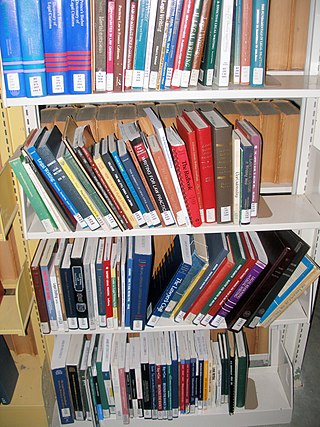Related Research Articles

In common law legal systems, black-letter law refers to well-established legal rules that are no longer subject to reasonable dispute. For example, it is "black-letter law" that the formation of a contract requires consideration, or that the registration of a trademark requires established use in the course of trade. Black-letter law can be contrasted with legal theory or unsettled legal issues.
A fatwā is a legal ruling on a point of Islamic law (sharia) given by a qualified Faqih in response to a question posed by a private individual, judge or government. A jurist issuing fatwas is called a mufti, and the act of issuing fatwas is called iftāʾ. Fatwas have played an important role throughout Islamic history, taking on new forms in the modern era.
Public law is the part of law that governs relations between legal persons and a government, between different institutions within a state, between different branches of governments, as well as relationships between persons that are of direct concern to society. Public law comprises constitutional law, administrative law, tax law and criminal law, as well as all procedural law. Laws concerning relationships between individuals belong to private law.

Law reports or reporters are series of books that contain judicial opinions from a selection of case law decided by courts. When a particular judicial opinion is referenced, the law report series in which the opinion is printed will determine the case citation format.

A hornbook (horn-book) is a single-sided alphabet tablet, which served from medieval times as a primer for study, and sometimes included vowel combinations, numerals or short verse. The hornbook was in common use in England around 1450, but may originate from more than a century earlier. The term (hornbook) has been applied to different study materials in different fields but owes its origin to children's education, represented by a sheet of vellum or paper displaying the alphabet, religious verse, etc., protected with a translucent covering of horn and attached to a frame provided with a handle.
A casebook is a type of textbook used primarily by students in law schools. Rather than simply laying out the legal doctrine in a particular area of study, a casebook contains excerpts from legal cases in which the law of that area was applied. It is then up to the student to analyze the language of the case in order to determine what rule was applied and how the court applied it. Casebooks sometimes also contain excerpts from law review articles and legal treatises, historical notes, editorial commentary, and other related materials to provide background for the cases.

Legal writing involves the analysis of fact patterns and presentation of arguments in documents such as legal memoranda and briefs. One form of legal writing involves drafting a balanced analysis of a legal problem or issue. Another form of legal writing is persuasive, and advocates in favor of a legal position. Another form legal writing involves drafting legal instruments, such as contracts and wills.
In law, a secondary authority is an authority purporting to explain the meaning or applicability of the actual verbatim texts of primary authorities.

West is a business owned by Thomson Reuters that publishes legal, business, and regulatory information in print, and on electronic services such as Westlaw. Since the late 19th century, West has been one of the most prominent publishers of legal materials in the United States. Its headquarters is in Eagan, Minnesota; it also had an office in Rochester, New York, until it closed in 2019, and it had an office in Cleveland, Ohio, until it closed in 2010. Organizationally, West is part of the global legal division of Thomson Reuters.
Ya'qub ibn Ibrahim al-Ansari, better known as Abu Yusuf (d.798) was a student of jurist Abu Hanifa (d.767) who helped spread the influence of the Hanafi school of Islamic law through his writings and the government positions that he held.
The canon law of the Catholic Church is "how the Church organizes and governs herself". It is the system of laws and ecclesiastical legal principles made and enforced by the hierarchical authorities of the Catholic Church to regulate its external organization and government and to order and direct the activities of Catholics toward the mission of the Church. It was the first modern Western legal system and is the oldest continuously functioning legal system in the West, while the unique traditions of Eastern Catholic canon law govern the 23 Eastern Catholic particular churches sui iuris.
The casebook method, similar to but not exactly the same as the case method, is the primary method of teaching law in law schools in the United States. It was pioneered at Harvard Law School by Christopher Columbus Langdell. It is based on the principle that rather than studying highly abstract summaries of legal rules, the best way to learn American law is to read the actual judicial opinions which become the law under the rule of stare decisis.
The Restatement (Second) of the Law of Contracts is a legal treatise from the second series of the Restatements of the Law, and seeks to inform judges and lawyers about general principles of contract common law. It is one of the best-recognized and frequently cited legal treatises in all of American jurisprudence. Every first-year law student in the United States is exposed to it, and it is a frequently cited non-binding authority in all of U.S. common law in the areas of contracts and commercial transactions. The American Law Institute began work on the second edition in 1962 and completed it in 1979; the version in use at present has a copyright year of 1981.
Richard Freer is a leading American academic in civil procedure and the Robert Howell Hall Professor of Law at Emory University School of Law in Atlanta, Georgia. He has written numerous articles and has published 11 books during his career. Currently, his book on civil procedure is the preferred text on the subject at many law schools throughout the country. Freer is also a member of the Barbri staff and has lectured for Barbri for over thirty years.
John de Breton was a medieval Bishop of Hereford. He served as a royal justice and sheriff before being nominated to Hereford. He is sometimes credited with the legal treatise Britton; but in its current form Breton cannot be the author as the work refers to laws written 15 years after the bishop's death.
The Oxford University Standard for Citation of Legal Authorities (OSCOLA) is a style guide that provides the modern method of legal citation in the United Kingdom; the style itself is also referred to as OSCOLA. First developed by Peter Birks of the University of Oxford Faculty of Law, and now in its 4th edition, it has been adopted by most law schools and many legal publishers in the United Kingdom. An online supplement is available for the citation of international legal cases, not covered in the main guide.
Books of authority is a term used by legal writers to refer to a number of early legal textbooks that are excepted from the rule that textbooks are not treated as authorities by the courts of England and Wales and other common law jurisdictions.
In United States legal education, hornbooks are one-volume legal treatises, written primarily for law students on subjects typically covered by law school courses.

Paul Goldstein is a law professor at Stanford Law School.
Wayne R. LaFave is an American legal scholar who specializes in the Fourth Amendment to the U.S. Constitution and serves as the David C. Baum Professor of Law Emeritus at the University of Illinois College of Law.
References
- ↑ Walker, David (1980), Oxford Companion to Law, Oxford University Press, p. 1234, ISBN 0-19-866110-X